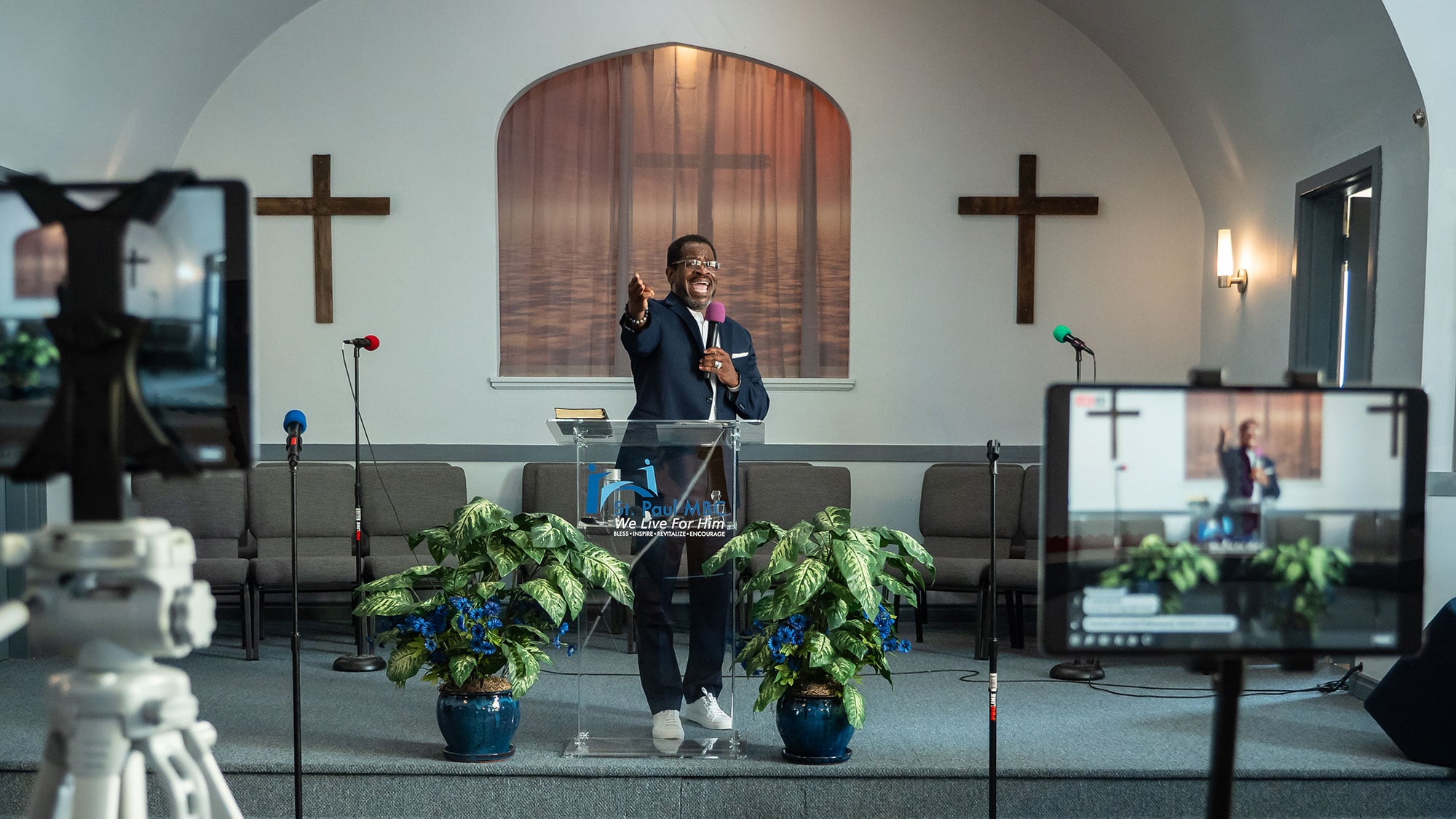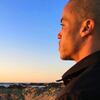Pastor Walter Hills sits in a chair on a raised altar, in front of a large gold crucifix. A 36-year-old African American man, dressed in a dark suit jacket and white button-up shirt, Hills leads his congregation in worship, thanking God "for giving us a place where we can go to you in prayer."
But on this Sunday in April, Hills is by himself.
He sits in a virtually empty church in North Portland, preaching to his flock live via Facebook.
"Everything has changed," says Hills, pastor of New Hope Missionary Baptist Church in North Portland's Boise neighborhood. "My message has changed. The presentation has changed. It has literally impacted every aspect of what I do."
Like bars, coffee shops and schools, Oregon's houses of worship have been following strict social distancing guidelines to help slow the spread of COVID-19. Churches have closed their doors to their congregations and have seen their collection plates go empty for months. Some pastors bridle at those rules: Ten conservative evangelical churches sued to reopen last week.
Portland's black community depends on churches more than most. But it has also had to grapple for years with greater obstacles to reaching the buildings—thanks to decades of displacement to the edge of town.
Craig Brown, pastor of North Portland's St. Paul Missionary Baptist Church, says his congregation has fully embraced livestreaming and online video conferencing since the arrival of COVID-19 and social distancing measures. He says it's had a silver lining, effectively reuniting an exiled community.
"A lot of my members have been pushed out towards the Numbers," he says. "What this pandemic has made us realize is that God is calling us to use other avenues to reach people. What else is there to do? We have all this technology, so we might as well put it to use to reach people."

Portland is famously not a religious city. But one key exception is the city's black population. The church provided refuge and encouragement during enslavement, Jim Crow, and the civil rights movement.
Portland's black residents have faced decades of displacement, by urban renewal projects and discriminatory real estate practices. The black community, once centralized in the Albina neighborhood, has since scattered across the city, largely out to the areas east of 82nd Avenue, in a part of the city known as the Numbers.
"Not only do we have to meet the needs of the community we're in," Hills says, "we also have to meet the needs of our members who don't live in our community, and those sets of needs are completely different."
Hills and Brown relate how many older members of their respective churches have had to contend with long, early-morning commutes, often depending on public transportation, to attend Sunday service at the same church they'd once lived a short stroll from.
Clifford Chappell, pastor of St. Johns All Nations Church of God in Christ, says how his small North Portland church, consisting of about 50 members, has "lost a lot of people during the almost 20 years that I've pastored here. We've probably seen our congregation turn over at least a half-dozen times in that time frame, mostly because of gentrification. It's challenging to have a church that's stable when you're having that kind of turnover."
Still, the pandemic created new problems. Church leaders now not only need to account for the well-being of their members but the solvency of their churches.
Though not required to pay taxes, the church still has myriad bills—building expenses, utilities, staffing—and churches, like many other institutions, largely depend on people coming through the doors. Jeffrey England, deacon at St. Paul MBC, puts it this way: "The bills are going to be coming, regardless of whether the doors are closed or not."
Dr. T. Allen Bethel, of Northeast Portland's Maranatha Church, attributes the church's revenue loss to two factors: the statewide ban on in-person Sunday gatherings, where the church receives much of its cash offerings, and members who have recently lost their jobs due to the shutdown and can no longer contribute the same amount in tithes or donations. "We're trying to give options to those who need them," Bethel says, "but the impact financially on the congregation is taking a toll."
Brown estimates offerings at his church have dropped about 20 percent since the pandemic. "But we have picked up a lot of additional viewers with online streaming," he says. "Our online giving had a really good spike in the middle of April, and it looks like that trend is going to continue, but I don't know how long that will last."

Each church takes a different approach to livestreaming.
Hills has been streaming from church, seated casually and unaccompanied on the altar. Chappell broadcasts from his own home, and Bethel will also begin streaming from home. Brown has been streaming to Facebook and Instagram from the church sanctuary, backed by a reduced praise team, including a couple of musicians and singers, and a few assistants to help on the tech side. The pews, however, remain empty.
"I was going to do it from my home, but it just doesn't have the right feel for me," Brown says. "I want to be able to still give the same kind of energy I would give on a Sunday morning if everyone was here."
"With this virtual church, people are able to go online and feel connected, they're able to see each other," Chappell says. "They've expressed to me that they miss meeting in a church, but if they can't meet there, this is the next best thing."
Pastors have been finding other ways to engage their homebound congregations, including offering conference call lines for older members who don't have access to a computer or the internet.
Brown says he'll keep holding services digitally until public health experts say it's safe to gather. He has no interest in pressuring the state to reopen his sanctuary.
"A lot of churches, including my own, may be hurting a little bit financially," he says, "but it's better for us to be physically healthy, so we can eventually start welcoming everybody back."
Moreover, he doesn't expect the return to physical services to be easy.
"It's going to be hard for a lot of churches," Brown says. "We're going to have to pick and choose what members come to church on certain days, to adhere to social distancing."
Hills will continue to livestream his sermons from an otherwise empty sanctuary, leading his homebound congregation in prayer.
"We're resilient people and we find ways to bounce back and to respond to whatever adversity we face," he says. "We have a tendency to make great things out of bad situations. I am confident that, one way or another, we will find a way to allow this to do the same."


